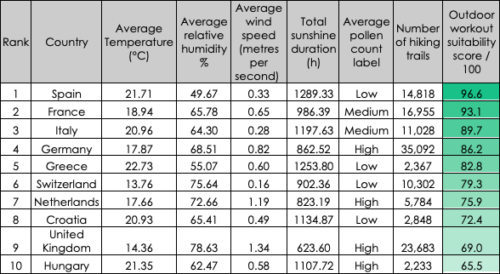With temperatures rising in the UK ahead of summer, online searches for “outdoor workouts” have increased 131% in the past month!
With this in mind, the experts at Live Rugby Tickets were keen to discover which European countries are the best for an outdoor workout this Summer. To do this, they created a points-based index system evaluating several factors in 28 European countries, including average temperature, wind speed, pollen count, humidity level and sunshine hours. Each country was then ranked out of 100 for its suitability for an outdoor workout this summer.
UK RANKED NINTH BEST EUROPEAN COUNTRY FOR OUTDOOR WORKOUTS

The study found that UK places ninth with an outdoor workout suitability score of 69.0/100.
Despite having the lowest hours of sunshine, and the highest average wind speed and relative humidity in the top 10 countries analysed, the United Kingdom boasts the second-highest number of hiking trails (23,683) which significantly contributed to its high rank. This is a staggering 90% more hiking trails than Hungary has (2233).
In the UK there are lots of choices for hike enthusiasts, however, more protection and safety measures need to be taken as a wetter surface and faster wind may easily lead to injuries and loss of balance.
TOP 10 BEST EUROPEAN COUNTRIES FOR EXERCISING OUTDOORS
The findings revealed that Spain is crowned the ultimate country for an outdoor workout, with a suitability score of 96.6/100. The country boasts the second-highest average temperature of the top ten countries analysed (21.71°C), only behind Greece (22.73°C). As exercising in high humidity can lead to dehydration, fitness fanatics in Spain can take advantage of low humidity levels ideal for outdoors (49.67). This is 36% lower than the United Kingdom, which has the highest humidity level in the top ten (78.63%).
France places second with an outdoor workout suitability score of 93.1/100. With average temperatures of 18.94°C and a medium pollen count (0.29 grains per m3), France is a more favourable destination for outdoor workouts than Belgium, which has a high pollen count of 0.67 grains per m3. Low rainfall in France has also contributed to a high suitability score. The total precipitation per month is among the lowest of the top ten (265.05 mm), nearly half the level of rainfall experienced in Switzerland (620.13). France’s low precipitation is vital for exercising outside because increased precipitation creates wet surfaces which can lead to injuries.
At the bottom of the top 10 chart is Hungary, with an outdoor workout suitability score of 65.5/100. Hungary places low in the ranking due to its high pollen count (0.75 grains per m3) and low number of hiking trails (2,233). Hungary has 93% fewer walking trails than Germany, which is home to the most in the top ten (35,092).
Fitness expert, founder of Altered Health Solutions, Carley Mellors-Blair commented on the positive impact of exercising outdoors:
Exercising in plenty of sunshine can have a massively positive impact. It increases your vitamin D absorption, which is amazing, lowers your blood pressure, can increase cognitive function, and boosts your mood. Also releasing happy hormones!
Carley Mellors-Blair, founder of Altered Health Solutions


